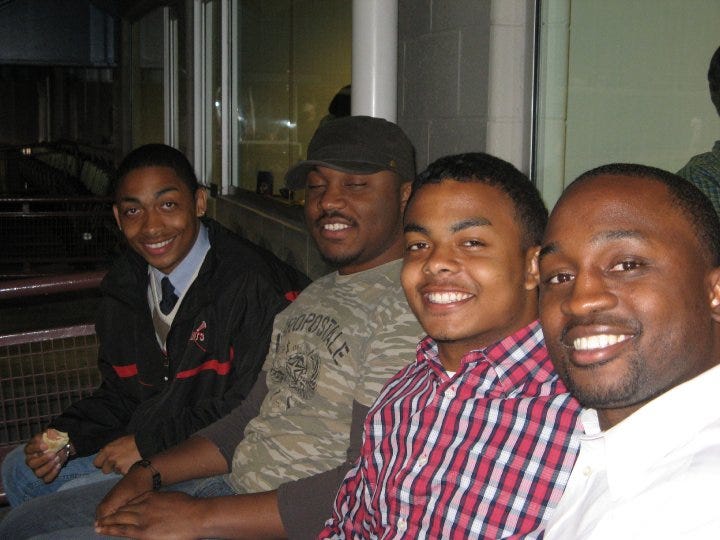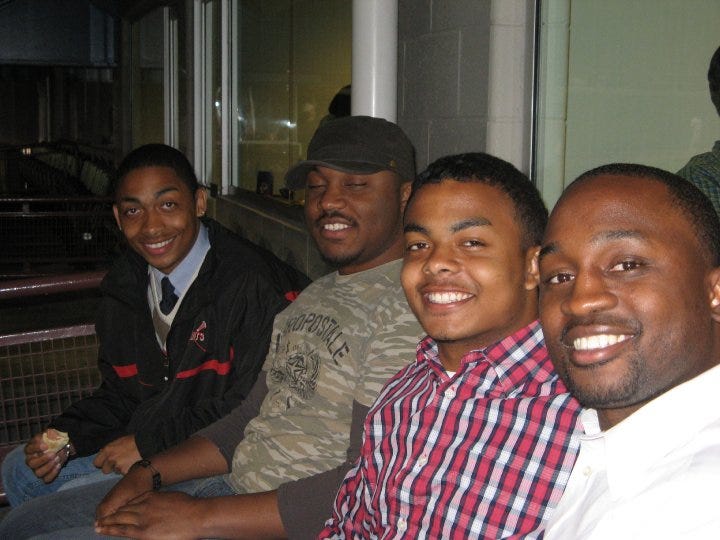The future of police transparency in the Commonwealth is in court
Case could advance the cause of police transparency in Massachusetts — or set it back decades

“He … loved to go skateboarding, loved to spend time with women,” Eric Mack said of his younger brother Anthony Harden. “[He] was more of an overgrown kid than anything else.”
On November 22, 2021, Fall River police officer Chelsea Campellone fatally shot the 30-year-old Harden in his bedroom less than three minutes after entering his apartment.
Two years later, Mack still has questions about why Campellone killed Harden. But Bristol County District Attorney Thomas Quinn’s office — which investigated the shooting and said it was justified — has refused to release surveillance video, photographs, recorded interviews with police officers and EMTs, and other records that would shed light on what happened that night.
Quinn’s office released some records, but it blacked out the names of dozens of officers and other public employees involved in the investigation. Quinn’s office has even refused to release the names of the two officers involved in the shooting.
After Mack learned the two names from public court documents, and local media reported them — revealing that the second officer present at the shooting, Michael Sullivan, is friends with Quinn’s son — the DA’s office continues to argue that their identities should be kept secret.
“The longer this goes on, the more it feels like they are hiding something,” Mack said during a recent interview on the Lights Out Mass podcast. “I don’t know how to draw any other conclusions other than there’s something they don’t want me to see.”
Mack sued Quinn’s office in February 2022, and his ongoing legal battle, which is currently before the highest court in Massachusetts, could determine the future of police transparency in the Commonwealth.
Suffolk County Superior Court Judge James Budreau ruled against Quinn in March, ordering the DA’s office to release all the records sought by Mack. In September, Budreau also ordered the DA’s office to pay $44,000 for Mack’s legal fees and $1,000 in punitive damages.
However, Quinn’s office appealed to the Massachusetts Supreme Judicial Court, which will hear oral arguments on December 6. The case is a major test of the 2020 police reform law that the state Legislature passed in response to the public outcry over the police murder of George Floyd. The DA’s office argues that the law, which was written in part to make policing more transparent, does the opposite.
According to the brief by Quinn’s office, the names of officers connected to investigations can only be released by the Massachusetts Peace Officer Standards and Training (POST) Commission, the state agency the 2020 law established to oversee officer certification. Although the law does not say this, Quinn’s office argues that it’s implied.
“The Legislative intent and language show that the names of the officers in these records should not be released publicly without the thorough consideration by the governmental agency that was specifically authorized by the Legislature to do so,” writes Assistant District Attorney Mary Lee, who is representing Quinn’s office.
The POST Commission released its police disciplinary database to the public earlier this year. However, it only included information about complaints that resulted in findings of wrongdoing, which represent a tiny fraction of allegations against officers.
Listen to the Lights Out Mass episode about the POST Commission database here.
If the Supreme Judicial Court sides with Quinn’s office, it would set the cause of police transparency back decades, overturning a landmark state Appeals Court decision. The 2003 ruling determined that internal-affairs records are not private personnel records, including when police departments say the accused officers did nothing wrong.
“If the Legislature intended to make the POST the only source for the names of police officers who have been alleged to have committed misconduct, it would have said so,” argues Howard Friedman, the Boston civil rights lawyer who is representing Mack.
Friedman declined to be interviewed while the lawsuit is pending. Quinn’s office did not respond to an emailed list of questions or make anyone available for an interview.
The 2020 law includes updated language that says the privacy exemption to the Public Records Law does not apply to records of any law-enforcement misconduct investigation. However, Quinn’s office argues that because it said the shooting was justified, the investigation wasn’t a misconduct investigation and the exemption applies.
“Their logic is circular. We didn’t find anything, so you don’t get to see the rest of it,” Mack said. “They’re taking a law geared towards police transparency and trying to make it less transparent. … So the whole spirit of the law, they’re undermining immediately.”
Mack said that he hopes the Supreme Judicial Court will clarify the law in a way that ensures the public can get answers when police kill people.
“I think it’s very important that I bring this fight to its conclusion, because there are a lot of families out there,” Mack said. “A lot of them don’t ever find out who shot their loved one.”
According to Friedman: “Keeping important portions of investigations secret causes the public to question the results. This reduces confidence in the justice system, which is against the public interest.”
But the DA’s office sees things very differently. Lee, the assistant DA, argues that Judge Budreau’s order to release the names and records “give[s] public employees no quarter, no empathy, and no privacy.”
“It is one thing for a public official or employee to engage in wrongdoing and then face public condemnation because the public interest outweighs the individual’s privacy right,” Lee writes. “It is, however, quite another matter for a person to work in the public interest, to face tragedy, survive, have her actions determined to be justified, and then to be identified for public inspection and harsh judgment.”
She continues: “Public employees are people, individuals who fail, persevere, succeed, come up short, stay or sometimes just quit. But they deserve some rights, some privacy, and the Public Records Law permits those rights.”
“I read that to say you’re protecting somebody who may have done a bad job,” Mack said. “If Chelsea Campellone killed my brother in a way that [she] shouldn’t have done, we don’t need to protect her. The public should know every single detail about what happened, and they get to make a decision about this.”
Quinn, while running for reelection in 2022, said that his office had released all the evidence — even as it fought against Mack’s public records lawsuit.
“We just published a report … on our website with all the evidence there for everybody to see,” he told Massachusetts Lawyers Weekly. “Nothing’s been covered up.”
Mack, responding to Quinn, pointed out that the DA’s office would not even say Campellone and Sullivan’s names in its Supreme Judicial Court brief.
Journalism like this takes a ton of time, energy, and care. Please consider signing up for a paid subscription to The Mass Dump or sending a tip via PayPal to make more work like this possible.
You can also follow The Dump on Facebook, Twitter, Bluesky, and Mastodon.
“It’s Just An Odd Thing to Ask”
According to a report by Quinn’s office, Harden’s girlfriend called police on November 22, 2021, and she told the two responding officers that Harden had physically assaulted her two days prior.
The officers entered Harden’s apartment with help from the landlord, according to the report. Less than three minutes later, one of the officers radioed in that shots had been fired, the report continues.
The report alleges that Harden attempted to stab a male officer, and a female officer shot Harden twice to protect the male officer. Neither officer was injured during the alleged attack, according to the report, and neither officer was wearing a body camera.
Mack said he has questions about how police found the steak knife prosecutors allege Harden wielded. He wants to see the three-hour video from a neighbor’s surveillance camera that shows the outside of Harden’s apartment and would reveal who entered and exited and when they did so.
“There are no pictures that show that there was a knife near my brother,” Mack said. “There’s no evidence that there was a knife ever near my brother.”
Mack said that police interviewed him and his family after the shooting.
“[They] asked us all kinds of questions about his background without telling us he’s passed away,” Mack recalled. “They said, Did he have any guns in his house? Did he have any knives in his house? Did he have anything that can be used as a weapon? … It’s just an odd thing to ask [those] questions if you already have a weapon.”
A photograph released by Quinn’s office shows a steak knife behind a TV on a cluttered desk across the room from where Harden was shot.

Sullivan told a sergeant at the scene of the shooting that Harden attacked him with a knife, but the officer later said in an interview with the Massachusetts State Police that it was an unknown object, according to redacted records that Quinn’s office released along with its report.
Campellone said Harden had an object that “appeared to be a knife” but that she did not see it after she shot him, the records say.
A search-warrant affidavit Mack obtained from Fall River District Court says that emergency responders found a knife underneath Harden, then a police officer moved it to a desk. However, this story is contradicted by the police reports released by Quinn’s office.
A sergeant said that after the responding officers left the apartment, he performed a “secondary walkthrough” and found a knife on a desk, according to the records. An officer said that later that evening, he called the sergeant to say that he had found the knife two feet away from Harden and moved it to the desk, according to the records.
None of the other police officers and EMTs who were present reported seeing the officer locate and move the knife, the records show.
“That story, quite frankly, I don’t believe,” Mack said. “But what’s important about that is there’s surveillance video that shows what happened, and they refused to release the surveillance video.”
Lee argues that releasing the surveillance video would violate the privacy of the neighbor who provided it to investigators and “likely chill future individuals who might otherwise want to cooperate with the police.” She also argues that the video shows the “comings-and-goings” of people on private property.
Friedman argues that the video is a public record because it shows public officials carrying out their jobs in a public area.
“This isn’t just some place where people are just walking through and strolling through, living their normal day,” Mack said. “It’s a homicide investigation with police tape on it.”
“Police Officers Might Be More Honest”
Although Quinn’s office tried to hide the names of the two officers involved in the shooting, Mack was able to find them in the affidavit police filed with the district court when seeking a warrant for Harden’s apartment.
The officers’ identities turned out to be very relevant, Mack said, pointing out that Sullivan is friends with Quinn’s son.
Quinn acknowledged the friendship in a July 2022 interview with The Boston Globe, but he said it didn’t matter.
“[Sullivan] wasn’t the focus of the investigation — despite what Mr. Mack says — no matter who he was,” Quinn said.
Campellone was involved in five car accidents between July 2020 and October 2021, according to disciplinary data the Fall River Police Department submitted to the POST Commission.
Four of the accidents resulted in findings of wrongdoing by the department. One was listed as “open” when the department submitted the data.
Campellone was also accused of physical abuse in June 2020, although the department deemed the complaint unfounded, according to the data.
When Quinn’s office released its report, it included information about Harden’s criminal history that was unrelated to the allegations his girlfriend made to police the day of the shooting.
“They wanted the ability to release anything they could about him, while simultaneously saying the background of the police officers was irrelevant to the shooting,” Mack said. “That gives them the ability to paint the story they want. There’s a bad guy, and … the good guys are the police officers who have no name and face.”
In addition to the names and surveillance videos, Quinn’s office refused to release recordings of investigators’ interviews with officers and EMTs. Quinn’s office released written summaries of the interviews, which, Lee argues, balances the public’s right to know with “the privacy interests and safety of the individuals involved.”
She argues that the interviews are protected by an exemption for law-enforcement investigations. She writes that if interviews must be released, police and other public officials “may, and likely will, find it in their best interests to decline to be recorded,” which will harm future investigations.
“Once deemed to be public records, recordings can be used in whatever way the public wishes,” Lee writes. “The public, however, can be cruel and harassing.”
Her brief continues: “It is easy to foresee the refusal of any public employee to submit to being recorded ever again, if the public release of the recorded interview can be expected to be uploaded to the internet, modified for TikTok, submitted to Facebook Reelz, Instagram Reels, and/or any individual podcast, for the purpose of ridiculing or vilifying the interviewees.”
Friedman points out that even though Campellone and Sullivan’s names have already been publicized, Quinn’s office has not presented any evidence that the disclosure resulted in embarrassment to either officer.
He argues that if interviews must be released, “police officers might be more honest knowing there will be public scrutiny of the officer’s statements or investigatory work.”
Mack said he wants people to understand how difficult and costly it is for people to sue when prosecutors hide information about investigations of police violence.
“Most people don’t have the ability to fight the DA’s office,” he said. “This process shouldn’t work this way.”
Listen to the full interview with Eric Mack here:
One Brother’s Fight for the Future of Police Transparency (with Eric Mack)
Listen now (59 mins) | A cop killed his brother. Now, Mack’s lawsuit could set important limits on police secrecy in Massachusetts.
Speaking of public records litigation, I’ll have an update about my own lawsuit against Thomas Quinn’s office and my other lawsuit against Northwestern District Attorney David Sullivan’s office soon.
Again, if you’d like to keep The Mass Dump running, please consider offering your financial support, either by signing up for a paid subscription to this newsletter or sending me a tip via PayPal.
If you have any story ideas, let me know about them! You can email me at aquemere0@gmail.com.
That’s all for now.




